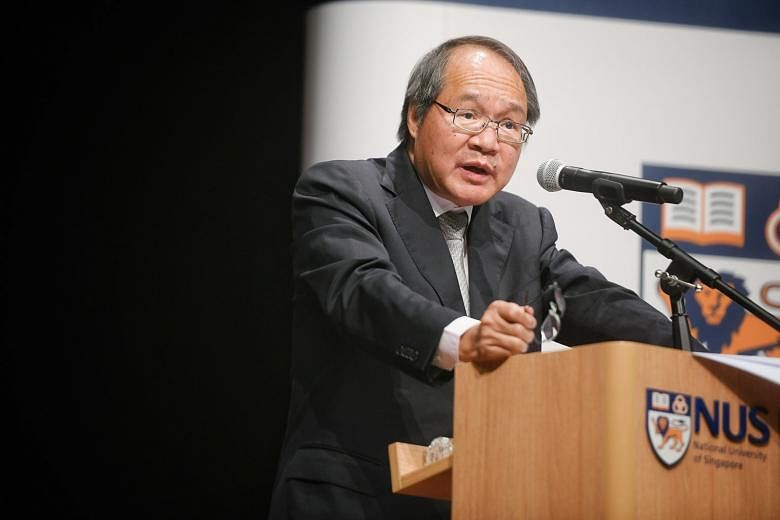Emerging problems in Singapore's society, such as fake news and offences against elderly victims, must be tackled with "resolute prosecutorial action", said Attorney-General Lucien Wong at the annual Singapore Law Review Lecture yesterday.
Making his first major speech since taking the post in January, Mr Wong listed these areas as examples of how the goals of the Attorney-General's Chambers (AGC) will have to change over time as public interest, which permeates all its decisions, evolves.
Explaining the menace from fake news, he noted that more news is now being delivered through social media, messaging apps and blogs where stories are written anonymously, and many are untrue or deliberately fabricated to achieve a specific end.
Underlining the "vital public interest to stop the flow of lies", he said the AGC will continue to use existing laws to act firmly and decisively against those who seek to distort the public narrative for their own ends.
Mr Wong referred to the recent action taken against fake news purveyors, such as the proprietors of the now-defunct The Real Singapore socio-political website.
Singaporean Yang Kaiheng, 28, and his wife Ai Takagi, 24, an Australian of Japanese descent, were convicted under the Sedition Act last year for deliberately sowing discord between Singaporeans and foreigners through a series of articles on their website. Yang was sentenced to eight months' jail while Ai received 10 months.
On protecting elderly victims, Mr Wong said the rapidly ageing population made for a "highly vulnerable group" who had amassed substantial savings for retirement and is a ripe target for fraudsters.
"We will robustly prosecute those who exploit the elderly, in order to deter such offences and give the full protection of the law to some of the most vulnerable members of our society," he added.
Mr Wong was giving a talk, titled Prosecution in the Public Interest, at the National University of Singapore's law faculty, providing insights into how prosecutorial discretion is exercised, which involves who to charge, the appropriate charges and sentences that prosecutors call for.
"Prosecution of a crime is more than just to punish the wrongdoer or offender - each prosecution is done with the public interest in mind," he said.
He added that prosecutions are conducted in the name of the public; offences are prosecuted for the good of the public; proceedings are held according to values expected by the public; and action is taken in the eye of the public.
But he said that even as prosecutors pursue important objectives like maintaining a secure Singapore environment or promoting a culture where rights are respected, this does not mean that every offence must be prosecuted.
Prosecutors take a solution-centric approach in dealing with crime, which means considering diversionary programmes to deal with young offenders instead of pressing charges in court, said Mr Wong. "The upshot of all this is that prosecutorial decisions are complex and difficult. There are many different interests that we are balancing in every case."
Underlining that there is no single, right answer in many difficult cases, he said "many exercises of the prosecutorial discretion reside along a continuum of credible, good-faith decisions made by my deputies, on the basis of evidence put before them".
"If the correct guiding principles are followed, I accord my officers a 'margin of appreciation' - in short, no one person unilaterally 'determines' the public interest in my Chambers," he added.
"We discuss our cases critically, and at times debate with each other vigorously, over the decisions we have to make every day. We do so precisely because it is only through that process of open engagement that we can arrive at fully considered decisions."
- Additional reporting by Nur Asyqin Mohamed Salleh


